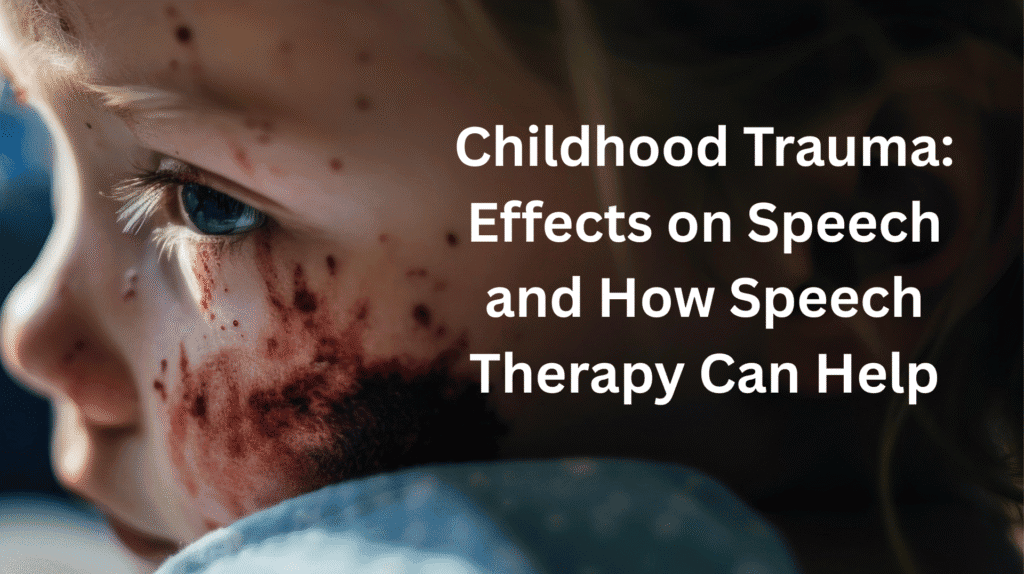Childhood Trauma: Effects on Speech and How a Speech Therapist Toronto Can Help
Childhood trauma can be defined as sudden and fear-evoking situations that threaten life, limb, or autonomy experienced during a person’s younger years. This is usually a negative and adverse life experience (although not all adverse life experiences can be traumatic). can profoundly affect how children communicate, among other things. This shapes not just what the child or person says, but how they say it as well. Below is a deeper analysis on how trauma affects speech and how speech therapy—especially from a speech therapist Toronto—can help the person regain their confidence, speech clarity, and social connection.

How Childhood Trauma Affects Speech
Delays in Neurodevelopment & Language Development
Younger children, usually before 3 years old, exposed to trauma are often observed to have expressive and receptive language delays. Accordingly, the elevated cortisol levels from the stress hinders brain functions responsible for language. As a result, these kids exhibit slow vocabulary growth, decreased memory and weaker skills in problem-solving. Fortunately, these can be mediated by speech therapist Toronto.
Speech Anxiety and Selective Mutism
The trauma experienced can lead to increased levels of anxiety in children. In some cases, this intense anxiety leads to selective mutism wherein kids speak normally only in a safe environment. In other situations, or scenarios, these children can fall silent because of fear. Over time when these children mature, they can develop an unconscious suppression of speech, especially when reminded of the negative past experience. However, if caught early and with the intervention of a speech therapist Toronto, this can be corrected.
Speech Prosody & Pragmatic Skills Disruption
Prosody is the rhythm and emotional tone of speech. Pragmatic skills, on the other hand, include storytelling, turn-taking, and interpreting facial cues. Both of these can be affected by childhood trauma. In most cases, these kids are observed to sound monotone or robotic. Needless to say, this leads to issues in social communication and even leads to bullying if not intervened early on by a speech therapist Toronto.
Challenges in Cognitive & Attachment
Aside from language issues, childhood trauma also negatively affects the person’s memory, attention and emotional regulation. Additionally, hypervigilance or being constantly in a state of high alertness can be observed that leads to communication disruption. These issues further make speech development slower and harder.
How Speech Therapy Helps
A speech therapist, Toronto, who focuses on trauma-informed care can help greatly in these cases. They usually use a nurturing, custom, and gentle approach to rebuild language skills.
Trauma-Informed Assessment
In a trauma-sensitive assessment, a speech therapist, Toronto, evaluates the child beyond speech defects. It also takes into account the kid’s emotional history, reaction to stress, and patterns related to attachment. This holistic approach serves as a guide to creating a personalized intervention plan.
Fostering a Safe & Trustworthy Environment
An experienced speech therapist, Toronto knows that therapy starts with having a safe space. This means creating an environment that is gentle and predictable. This also extends into having familiar routines, objects, activities, and a warm approach to help children feel secure while learning.
Play-Based & Strength-Focused Techniques
Therapists can implore various methods to facilitate the sessions. This may include art, play, storytelling, and active exercises. These creative methods help engage the child which leads to building speech skills indirectly. Moreover, sessions that focus on strengths and praise achievement, no matter how small, help boost confidence and motivation for these children.
Prosody & Social Communication Training
Modeling and guided practice by a trained speech therapist, Toronto, helps children learn to emphasize words and appropriately use pauses and tone. Additionally, it also helps them interpret body language correctly, hence enhancing emotional expression and improving the flow of conversations.
Family-Centered Collaboration
As always, parents and caregivers play an immense role. Therefore, a therapist must also coach them to model language at home. This should also include responding with empathy and communication into day-to-day activities. By having a consistent approach and support, better outcomes and faster progress are possible.
Choose Speech Link—Expert Speech Therapist Toronto
Here at Speech Link, we pride ourselves on having a team of expert and professional speech therapists. We also ensure to always stay on top of the current through trauma-informed practice. Thereby, ensuring tailor-made therapy plans that are specific to the individual’s needs.
